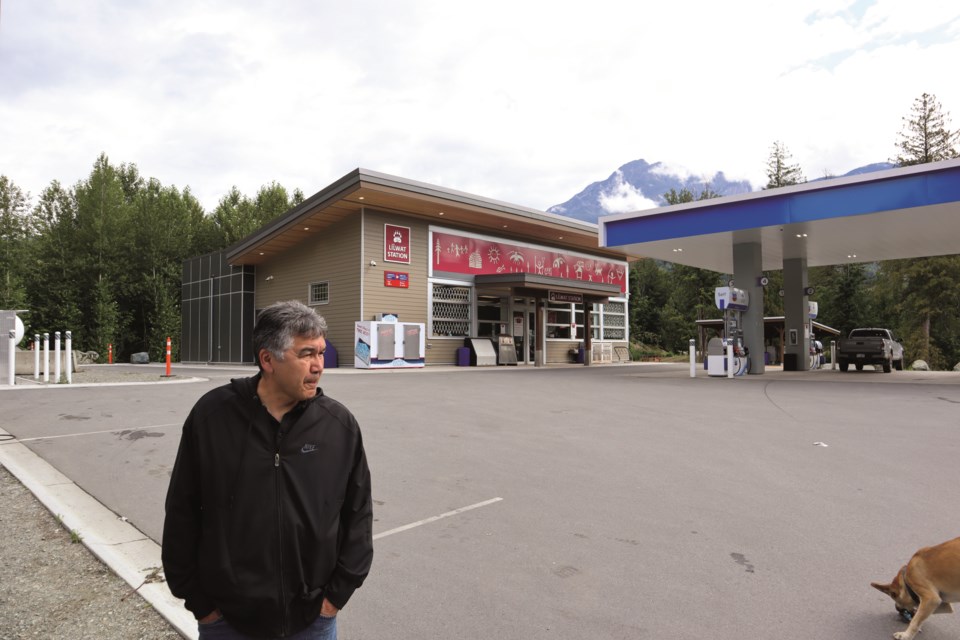The Lil’wat Nation has filed an appeal with B.C.’s Environmental Assessment Office over a licence held by a local bottled water company to extract groundwater on its traditional territory.
Since the 1970s, the Whistler Water company has drawn water for commercial use from the Spetch Creek area, first diverting surface water before switching to using wells in the ‘90s. Under its existing licence, the company extracts 187,000 cubic metres of water a year. The Nation said it has received no benefit in exchange and that the Ministry of Forests, Lands, Natural Resource Operations and Rural Development (FLNRORD) failed to adequately consult or assess the impacts on the Lil’wat’s land rights and title, and did not consider the principle of reconciliation included in the United Nations’ Declaration of the Rights of Indigenous Peoples (UNDRIP).
“We’ve said all along that we’ve had these rights but [for them] to be acknowledged there needs to be something that changes,” said Kúkwpi7 Skalúlmecw Chief Dean Nelson.
Since 2016, the Nation said it has discussed its concerns around the removal of bulk water from its territory with FLNRORD. The Lil’wat Land Use Plan designates Spetch Creek as a Nt̓ákmen Area, which prohibits commercial activities in order to protect the cultural and ecological features of the land. An archaeological site, called Nk̓ék̓lekw, sits within 180 metres of the two wells and features evidence of a traditional pit house, or Istken, as well as a culturally modified cedar tree.
“The access to the resources—or lack of—for the Nation is most concerning,” said Nelson, noting how the Lil’wat have managed the land and water around Qwalímak, or the Upper Birkenhead, since time immemorial. It’s through Canada’s Bill C-15, Ottawa’s response to the UNDRIP that was approved last month, that the Nation is reasserting its rights.
“We’ve made reference to other different cultural sites and we’re in the process of addressing them now as we gain some power and protection over those,” Nelson added.
The extraction licence, which the Lil’wat said was first proposed in 2017 and issued on May 19 of this year, authorizes the diversion of groundwater from the aquifer at Spetch Creek, and while the Nation contends that the licence is new, both Whistler Water and FLNROD said that it represents a renewal of an existing legacy licence as required by B.C.’s Water Sustainability Act.
“Whistler Water’s licence application is what we refer to as an Existing Use Groundwater application. This provides those users who were using groundwater prior to February 29, 2016 an opportunity to apply for a licence and have their first date of use recognized,” noted a ministry spokesperson in an email. The transition period ends March 2, 2022.
FLNRORD also indicated that licence consultation “will occur with First Nations” whenever the government reviews an application for an Existing Use Groundwater application. A follow-up email requesting more information on the consultation process was not returned by deadline.
For the Lil’wat, the issue is not the amount of consultation that took place, but rather that the Nation’s rights and title, as well as the cultural importance of the site, have never been addressed over the years, according to Nelson.
Whistler Water COO Bruce Gemmell, who noted he learned of the appeal and the site’s significance from Pique, wrote in a statement that the company “has immense respect for our First Nations, including, in particular, the Lil’wat Nation. The business has operated a bottling facility for 30 years using a BC Government issued water license for this existing well site. Whistler Water has not applied for a brand new license but instead applied, as a legacy license holder, to have its license updated under the Water Sustainability Act 2016, for exactly the same source. The updated license(sic) is integral to ensuring the continuance of the dozens of jobs with our operation. We are happy to talk to the Lil’wat Nation if they have any concerns.”







